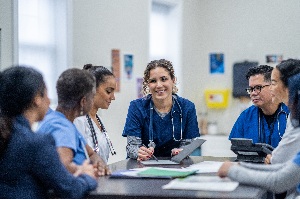 Anesthesiologist assistants (AAs) are healthcare professionals who work as part of the anesthesia care team under the direction of licensed anesthesiologists.1 They deliver anesthesia care to patients of all ages before, during, and after surgical procedures. Anesthesiologist assistants monitor vital signs and anesthesia equipment. They adjust anesthesia levels as needed and ensure patient safety and comfort throughout procedures. AAs work in hospitals, surgical centers, and wherever surgeries occur.
Anesthesiologist assistants (AAs) are healthcare professionals who work as part of the anesthesia care team under the direction of licensed anesthesiologists.1 They deliver anesthesia care to patients of all ages before, during, and after surgical procedures. Anesthesiologist assistants monitor vital signs and anesthesia equipment. They adjust anesthesia levels as needed and ensure patient safety and comfort throughout procedures. AAs work in hospitals, surgical centers, and wherever surgeries occur.
South University offers a Master of Medical Science in Anesthesia Science (Anesthesiologist Assistant) program in Savannah, GA, Orlando, FL, and West Palm Beach, FL. In this blog, you’ll learn about the phases of this Anesthesiologist Assistant program, including the real-world experience students gain.
Learning in the Labs and Classrooms
The first 15 months of our Anesthesiologist Assistant program feature a mix of didactic instruction and clinical experience. Didactic experience includes lectures, skills labs, problem-based learning discussions, group work, and simulation labs. The program uses quarters, not semesters. This means students begin new classes approximately every three months.
In the first year, students take foundational anesthesia science courses along with skills lab and simulation lab classes each quarter. “Our labs are meticulously designed to provide hands-on learning opportunities in a realistic and supportive environment that enhances our students' confidence and readiness to deliver safe and effective anesthesia care in clinical practice,” says Megan Busman, Assistant Professor in the West Palm Beach Anesthesiologist Assistant program.
Everything students learn in the skills lab is then applied in simulations and later with patients during clinical experiences. In the simulation lab, instructors assign students patient cases based on real-world scenarios. Students must then work as a group to come up with solutions. “Simulation lab is here to help students bridge the gap between what they learn in the classroom and what they will be applying in the operating room,” explains Leon Beaulieu, the West Palm Beach Program Director. “We create a safe environment to allow them to succeed and fail.”
Cameras record the simulation exercise. Afterward, the students and instructors watch the video to debrief and analyze what occurred and the decisions made. “These scenarios are built to mirror the experiences that they're going to have in their clinical coursework,” says Anna Warren, a faculty member in the Savannah Anesthesiologist Assistant program. “We're able to look at their strengths and talk about areas for improvement so that they can perform better in the clinical scenarios.”
Early Clinical Experiences and the White Coat Ceremony
Students enter the clinical setting in the first quarter, receiving supervised instruction that helps them get familiar with operating room practices. At the beginning of the second quarter, students start participating in clinical experiences. To honor this milestone, South University awards each student a short white coat. “This white coat is an outward symbol to patients and to providers alike that the student is in training and that this student is working on their practice,” shares Kristine Tindol, the Savannah Program Director.
A Year of Clinical Rotations
In the final year, students practice clinical anesthesia during rotations through general and subspecialty areas. Each rotation lasts approximately one month, during which students pair up with a preceptor for mentorship and guidance. These rotations offer firsthand experience through one-on-one supervised instruction in the operating room and other procedural locations.
“A majority of our faculty2 are not only instructors here on campus, but we are practicing AAs out in the community. We have the opportunity to precept our students in the operating room as well to help build that bridge between the knowledge they're gaining here on campus to the OR,” says Warren.
Throughout this year of rotations, students also complete a few virtual courses. The classes include a senior seminar where students discuss hazards, complications, and interesting cases they've seen in the OR. They also review recent peer-reviewed articles related to anesthesia care.
A hooding ceremony marks the end of the Anesthesia Science program and celebrates student achievements. At the ceremony, students receive a Master of Medical Science in Anesthesia Science.
Earning Your Degree at South University
The South University Anesthesiologist Assistant program tightly pairs theoretical knowledge presented in the classroom with practical applications of that knowledge. Students have the opportunity to apply knowledge gained in class using our mock operating room and anesthesia learning lab.
In addition to studying the biomedical and anesthesia sciences, the program is designed to help build the professionalism, clinical decision-making, and communication skills you’ll need in the field. Throughout the program, our instructors provide personalized support and assistance. After earning your degree and obtaining licensure, you will be ready to pursue a job1 working on an anesthesia care team.
Learn more about our Anesthesiologist Assistant program today!
--
1 South University does not promise or guarantee licensure, employment, or salary amounts.
2 Credentials and experience may vary by instructor.
Graduates are required to pass the national certification exam and obtain a state license in order to work in the field. (Exam names vary by program.) Please refer to the State Professional Licensure Determination and National Certification/Licensure section of the University catalog for additional information. South University cannot guarantee each graduate will pass the required licensure examinations. South University does not promise or guarantee licensure, employment, or salary amounts.
Clinical/Medical programs have a required in-person clinical, practicum, or externship requirement. We cannot guarantee flexibility in these components of the program.
Quotes from South University faculty are based on videos published in 2025.




